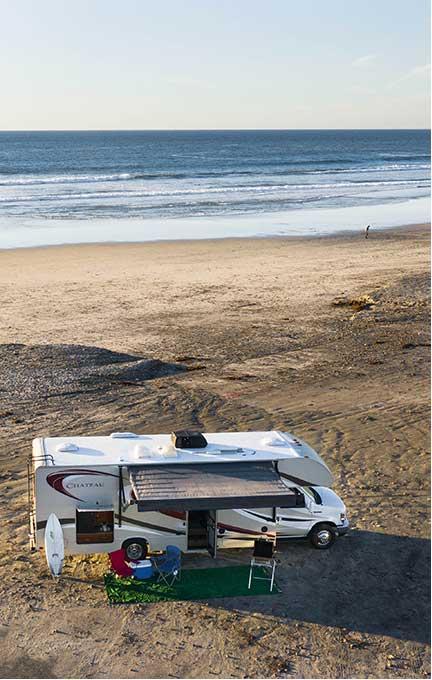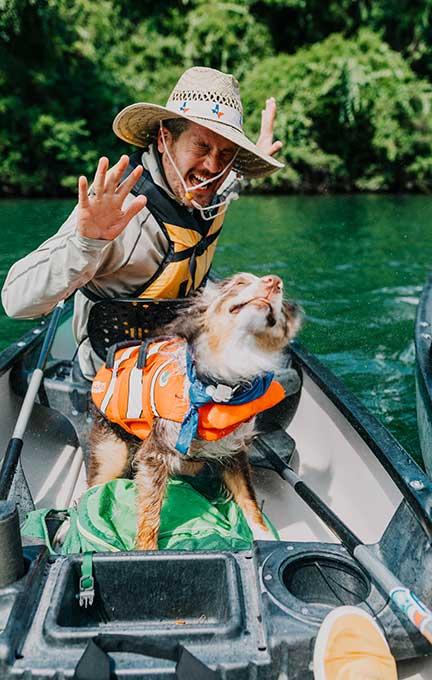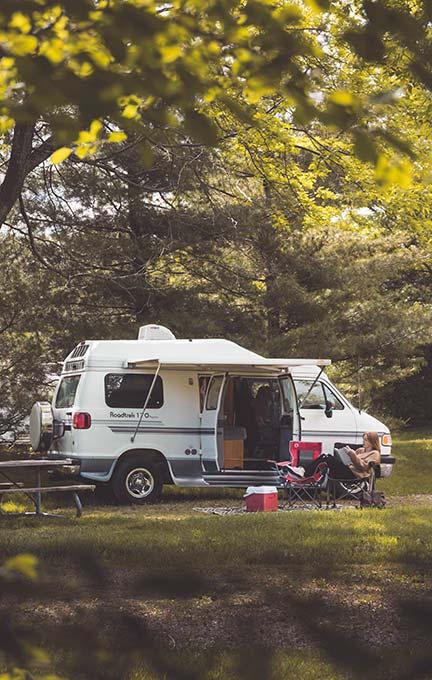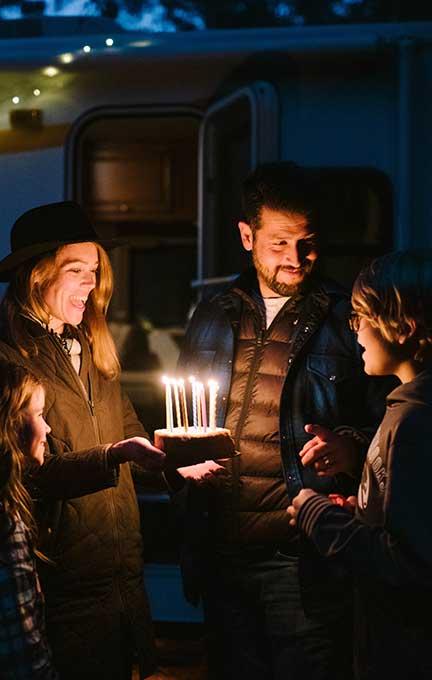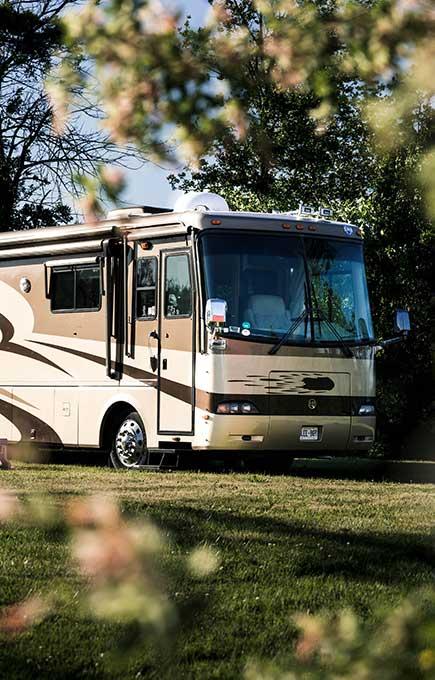Have you ever wondered what it feels like to wake up to a new horizon every morning? RVing offers just that – a fresh view with every sunrise. But where do you start if you’ve never driven an RV before? This guide is designed to help with RVing for beginners, ensuring you’re well-prepared for your first journey on the open road. Whether you’re considering renting or buying, there are several factors to weigh, and we’ll guide you through each step.
From understanding basic RV features to mastering the art of packing light or even trying it all out by renting an RV first, we’re here to help you prepare confidently for a memorable first trip.
Easy to Drive RVs For Rent Near You
Choosing the Right RV: A Beginner’s Guide
Understanding Different Types of RVs
RVs range from compact Class B camper vans suitable for solo travelers or couples to expansive Class A motorhomes that accommodate larger families with luxury amenities. Travel trailers and fifth wheels require a separate vehicle for towing but offer the flexibility to set up camp and use the tow vehicle for day trips. Weighing the pros and cons of each type is crucial:
- Class A Motorhomes: Offer ample space and comfort but can be challenging to drive and park
- Class B Camper Vans: Easier to maneuver and more fuel-efficient, but limited living space
- Class C Motorhomes: Balance between Class A’s size and Class B’s nimbleness.
- Travel Trailers and Fifth Wheels: Offer flexibility but require a capable towing vehicle.

Key Considerations Before Purchase
Before purchasing, consider the RV size and how it fits with your travel plans. Larger RVs offer more amenities but can be restrictive when navigating narrow roads or finding parking. Budget is another critical factor; apart from the purchase price, consider the ongoing maintenance costs, fuel consumption, and potential storage fees. Sleeping space, kitchen facilities, and storage should match your travel needs.
For these reasons, it might be best to try out an RV for awhile before you buy. Renting an RV can be a great way to do that. There are many great platforms out there, like Outdoorsy, that’ll help you find a variety of different RVs
Renting vs. Buying
For first-timers, renting an RV can be a wise decision. It allows you to experience RV travel without a long-term financial commitment. Renting various types of RVs can also help you understand which model best suits your lifestyle before making a purchase.
At Outdoorsy we have RVs for rent of all types and stripes. Pick one to fit any budget so you can test the waters before jumping in.
Packing Smart: Essentials and Overpacking Pitfalls
Essential Checklist
To ensure safety and comfort without overloading your RV, focus on packing the essentials:
- Safety gear (fire extinguisher, first-aid kit, emergency road kits)
- Basic toiletries (toothbrush, toothpaste, soap)
- Appropriate clothing for the weather
- Kitchen essentials (pots, pans, utensils, food supplies)
Check out our RV Packing Checklist for a detailed guide to stock up any RV type for a trip.
Avoiding Common Overpacking Mistakes
Many new RVers fall into the trap of packing as if they were outfitting a stationary home. Learning from seasoned travelers can be invaluable in keeping your load light. Essentials should not include items easily found along your route or that serve only one purpose without much necessity.

Space-Saving Tips and Tricks
Maximizing space is crucial:
- Use collapsible items like dish racks or laundry baskets.
- Store items in clear, stackable bins under seating areas or beds.
- Organize items to be accessible based on frequency of use.
Pre-Trip Preparations: Know Your RV
Familiarizing Yourself with Your RV’s Features
Spend time understanding your RV’s basic operations, from how to hook up water and electrical connections to operating the propane stove safely. Knowing how to manage your RV’s wastewater tanks is also crucial.
The Importance of a Perimeter Check
Before each departure, perform a perimeter check:
- Ensure all storage doors are secure.
- Check tire pressure and tread condition.
- Ensure all windows, doors, and the awning are secure.
Maintenance Musts
Regular maintenance checks can prevent road trip disasters. Key areas to monitor include the engine, batteries, and brakes. Regularly scheduled professional servicing can help catch issues before they become serious problems.
Navigation and Campsite Booking: Planning Your Route
Mastering RV Navigation
Utilize GPS systems designed for RVs, which consider vehicle size and road restrictions. Apps like Google Maps offer RV-specific routes, helping avoid low bridges or narrow roads.
Booking Campsites
Research and book campsites well in advance, especially in popular locations. Consider the size of the campsites to ensure they can accommodate your RV, and check for amenities like electrical hookups and water access.
Understanding Campground Etiquette
Being a considerate camper is essential:
- Observe quiet hours.
- Keep your campsite tidy.
- Respect the privacy and space of fellow campers.
On the Road: Driving Tips and Handling Challenges
Driving Stamina
Plan for shorter driving days to avoid fatigue, aiming for no more than 300-400 miles per day. Take regular breaks to stretch and rest.
Handling Common On-Road Challenges
Be prepared for various driving conditions:
- Check weather forecasts and road conditions frequently.
- Understand how to navigate your RV through different terrains, be it mountainous areas or urban environments.
Breakdowns and Emergencies
Equip your RV with necessary tools and spare parts for common issues. Know basic repair procedures and have a list of contacts for roadside assistance. Always have a well-stocked emergency kit and up-to-date insurance and registration documents easily accessible.

First-Time RVer FAQs
What should I pack for my first RV trip?
For your first RV trip, pack essentials like clothing, toiletries, medications, food, and drinks. Don’t forget camping gear like folding chairs, lanterns, a portable grill, and a first-aid kit. It’s also important to bring RV-specific items such as leveling blocks, a water pressure regulator, a sewer hose, and extension cords for electricity hookups.
Do I need a special license to drive an RV?
In most cases, you don’t need a special license to drive a standard RV, but it depends on the size and weight of the vehicle. For large motorhomes over 26,000 lbs, some states may require a commercial or special license. Always check your state’s regulations before you go.
How do I plan my RV route?
Use RV-friendly apps like Roadtrippers or Google Maps to plan your route. Look for campgrounds with RV hookups and ensure your planned route avoids roads or bridges with low clearance. Factor in stops for gas, groceries, and rest areas.
What are RV hookups, and how do I use them?
RV hookups provide water, electricity, and sewer access at campgrounds. To use them, connect your RV’s water hose to the campground’s water supply, plug the electrical cord into the power pedestal, and attach the sewer hose to dump waste into the campground’s sewage system. Always follow campground instructions for setup.
How do I conserve water and power while RVing?
To conserve water, use campground facilities when possible and limit your shower time. Install water-saving fixtures like low-flow showerheads. For power conservation, switch to LED lights, use solar panels, and limit the use of energy-intensive appliances. Make sure to monitor battery levels if you’re not hooked up to a power source.
How do I maintain my RV on the road?
Regular RV maintenance is essential. Check tire pressure and fluid levels before every trip. During your travels, inspect the roof for leaks, clean air filters, and ensure that the brakes are working properly. If something seems off, don’t hesitate to consult an RV technician.
How do I handle RV black and gray water tanks?
The black water tank holds sewage, while the gray water tank collects water from sinks and showers. Dump the gray water first to clear out any residue in the hose. Then, dump the black water. Make sure to flush the tanks with clean water after emptying and always wear gloves during the process.
What are the best apps for beginner RVers?
Great apps for beginner RVers include:
- Roadtrippers for route planning
- Campendium for finding RV parks and campgrounds
- RV Parky for locating RV-friendly services and rest stops
- GasBuddy for finding the cheapest fuel stops
- Allstays for detailed camping options and RV-friendly routes
How do I connect to Wi-Fi while RVing?
Many campgrounds offer Wi-Fi, but it can be slow or unreliable. You can invest in a mobile hotspot device or use your smartphone as a hotspot. For remote areas, consider a signal booster to improve connectivity.
What should I do if my RV breaks down?
If your RV breaks down, move to a safe location, if possible, and turn on your hazard lights. Contact roadside assistance, and notify the campground if you’ll be late or unable to arrive. It’s wise to have a roadside assistance plan like AAA or a specialized RV service that can help with tows and repairs.
How can I make my RV trip more comfortable?
Bring comfort items like pillows, cozy blankets, and favorite snacks. Set up outdoor living spaces with rugs and chairs, and add personal touches inside the RV like framed photos or plants. Stay organized with storage bins and plan leisurely activities to avoid feeling rushed.
Is boondocking safe for beginners?
Boondocking, or camping without hookups, can be safe for beginners if you prepare well. Choose popular boondocking spots that are frequently used by other RVers. Make sure to bring enough water, fuel, and food for your stay, and ensure your RV’s power and waste systems can handle off-grid living for the duration of your trip.
Wrapping Up Your First RV Adventure
Embarking on your first RV journey is the beginning of a lifetime filled with explorations and discoveries. From selecting the ideal RV that suits your adventurous spirit to packing essentials without overloading, this guide has provided you with the essential knowledge to navigate the open roads with confidence. Whether you choose to rent or buy, understanding your RV’s features and maintaining it with care ensures that every journey is as smooth as possible. By planning your route, booking campsites early, and learning the etiquette of campground living, you’re ready to create unforgettable memories in the great outdoors.
As you prepare to travel through new landscapes, remember that every mile traveled adds to your experience and expands your horizons. The road ahead involves not only destinations but also the stories you’ll collect, the people you’ll meet, and the self-discovery in every sunset viewed from a different perspective. Let the journey refine your spirit, and may the freedom of the open road encourage you to explore further. After all, isn’t life about the adventures we choose to take?




